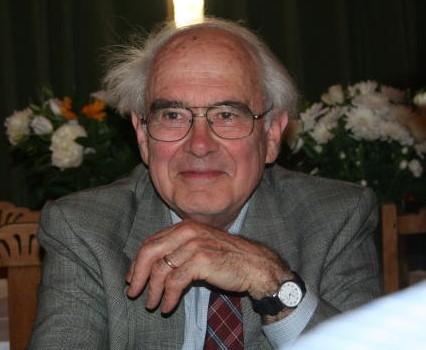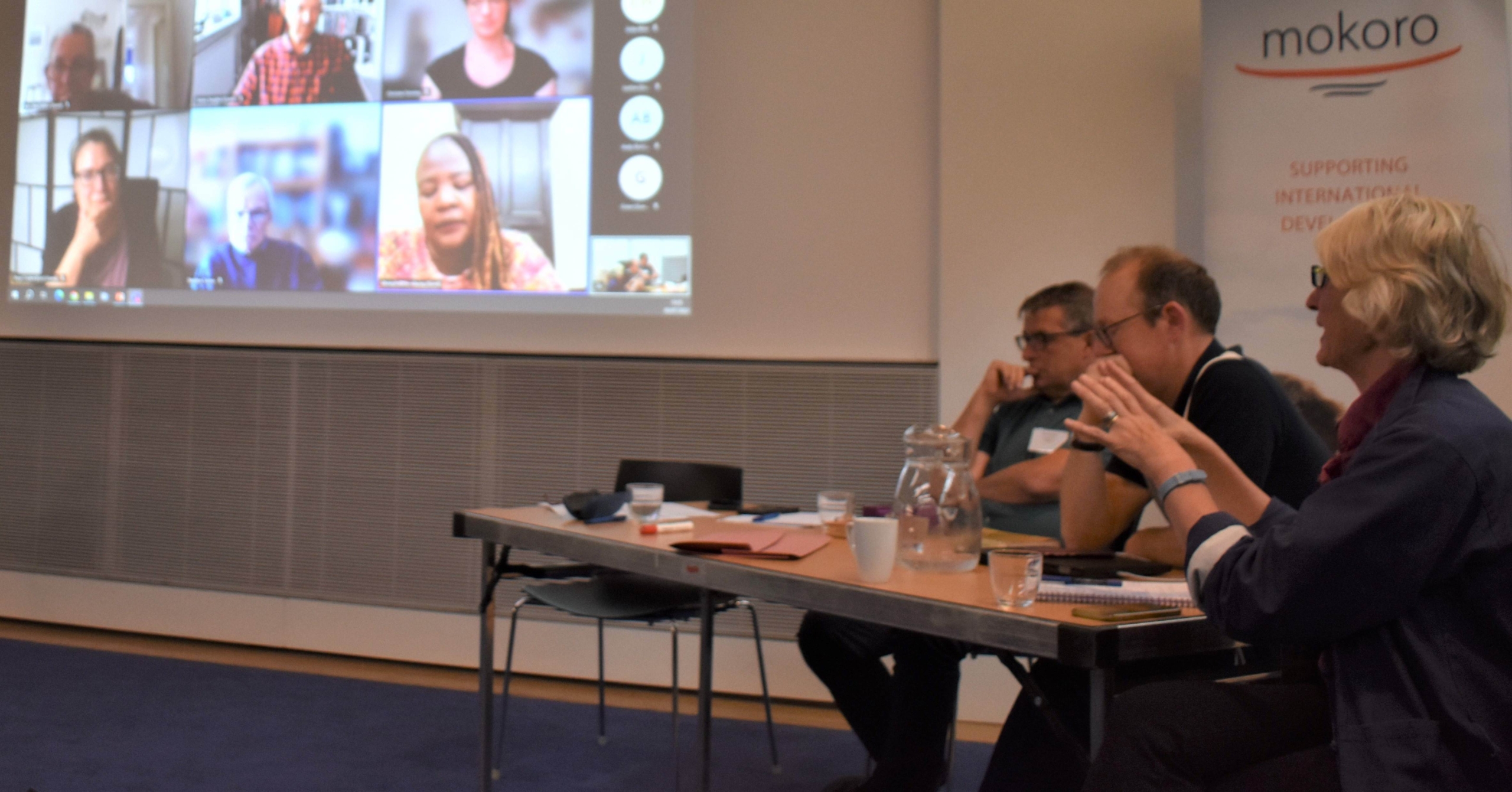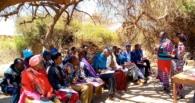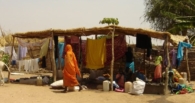Memories of Stephen Sandford
Mokoro Principal Consultants and Associates
1 March 2023
/
- 0 Comments
Stephen Sandford, who died on 10th February 2023, aged 88, was known and valued by many in the Mokoro circle. He was brought up in Ethiopia where his parents settled in the 1930s. His professional life was largely focused on livestock and pastoralism in Africa, but his Mokoro connections were personal as well as professional, as illustrated by the reminiscences that follow.

Picture by Gerda Adams at Mokoro’s 25th anniversary in 2007.
From Antony Ellman: I first met Stephen in 1961 in Oxford, where I was in my final year of an agriculture degree and Stephen was half way through a course in agricultural economics. I got to know him better when we both worked in Tanzania, and then in Ethiopia where he hired me as a consultant for the Livestock and Meat Board. This was just as Stephen’s elder brother Dick was handing over the baton to Stephen as head of planning in the LMB. The task they gave me was to draw up a plan for enabling shifting cultivators from the highlands around Adwa and Axum to move permanently to the lowlands of Enda Selassie, an area later fought over between Tigreans and Eritreans in the Eritrean independence war.
The plan came to nothing because of the war, but it gave me an insight into Stephen’s deep intellect, combined with a pragmatic understanding of the practicalities of development and change, which I greatly admired. This was always visible in his writings, and in the support and encouragement that he gave to both Ethiopian and visiting young professionals throughout his career.
Stephen was also very helpful to me when I was planning my first honeymoon in Ethiopia in 1967. I wanted to introduce my (now late) wife Ruth to the rigours of walking and camping in Africa, en route to the monolithic churches of Lalibela in the Central Highlands, which I had long wanted to see. Stephen encouraged us to make a one week trek to Lalibela with mules, starting from Woldiya on the eastern high road. Lalibe
la was then inaccessible by other means of transport, especially towards the end of the rainy season (when we went) when the rivers were still swollen and possibly impassable.
Stephen sent us to his parents’ farm at Mulu to borrow camping equipment. We had also borrowed, from a doctor friend of Ruth’s, an ancient Fiat 600 and it was unclear whether it would make it to Woldiya (it did, and we had a memorable
honeymoon). I have an abiding memory of Stephen’s mother, tweed suited, arms akimbo, saying as we set off from Mulu, “If you get stuck, summon a posse of men.” The exhortation could as well have come from Stephen!
From Martin Adams: I came to know and respect Stephen Sandford when he was helping to manage the Overseas Development Institute in London in the early 1980s. In 1982 he persuaded me to lead a three-month assignment to evaluate the Machakos Integrated Development Project, funded by the EEC, in Kenya. As it turned out, the decision proved to be very significant for me as it was the first time that I met Stephen Lister and learned about his proposals, along with colleagues, with whom he had been working in Botswana, and to be called ‘Mokoro’. After a few years, I was privileged to join it, along with my wife Gerda. When working in Botswana in 1989, I was introduced to his scholarly writings on the livestock sector. In November 1994, I met Stephen Sandford and members of his team in Tigray, where he was leading an imaginative rural development programme. Subsequently, we occasionally met at Mokoro meetings, which he attended even when he was invalided. Throughout his career, his work and writings were greatly valued and respected.
From Bev Jones: I am writing from Sudan – at least in the vicinity of Tigray. So it is easy to conjure memories of Stephen. In fact, it was his brother Dick who was my first teacher on Ethiopia. He kindly included me (as a new Christian Aid staff member) in a large FAO/Freedom from Hunger Campaign evaluation of southern Ethiopia just after the end of the war in 1991. He and I went exploring in Tigray and together we started up the new Farm Africa project there – in Work Amber.
Dick then handed over the mantle to Stephen – with whom I travelled with some trepidation. (He was more brusque than Dick.) As we jogged along in the Land Rover and he told me about his children, I asked whether any of them had married Ethiopians. Stephen suddenly brought his hand down on the dashboard with such a degree of force, that I was sure that my question had caused considerable offence. “To my lasting shame” he fulminated, “not one of my children has married an Ethiopian!” I knew then that we would get on just fine. And we did – on the various occasions when our paths crossed – including through Mokoro.
From Mohammed Mussa: I have a lot of stories to tell about Stephen Sandford but not sure where to start and what to write. I have known Stephen and his lovely and big family since 1970s when I was in high school. As a young high school student who came from Wollo to Addis Ababa for better education, I was privileged to be connected to the Sandford family and I was considered as one of the family members. As an enthusiastic high school student who dreamed to be successful in life, I had the privilege and support of Stephen. My communications with him had also impacted my command of English to be a successful high school student at that time. I always enjoyed sitting with Stephen listening to him about the economic, social and political issues in the world at large. The UK was very close to me, and I became well versed with the unwritten Constitution of the UK. Before I joined the Addis Ababa University, I already had learnt a lot about Ethiopian history thanks to Stephen. I cannot deny that he has positively influenced my choice of higher education to be an economist and I am lucky and very proud today. When I visited him in Oxford in 2014, he still had sharp memories and laughed when I raised some of our discussions during those old days.
My family is now well connected to the Sandford family, and we will continue to be connected.
Stephen, you achieved a lot in life and supported many, including myself, to be successful. We will always remember you dearly and RIP!!!
From Ray Purcell: I first came across Stephen professionally, when I was an agricultural economist in the Botswana Ministry of Agriculture in the 1970s. One of Stephen’s acolytes, Ralph von Kauffman, was running a World Bank livestock project and Stephen appeared from time to time on supervision missions. I was the small boy in shorts, and in reverential awe of his ability and reputation as a livestock sector colossus.
Whenever I met Stephen’s scientific work, his presence in meetings and later in Mokoro seminars, I was struck by the scope and depth of his incisive knowledge. He was indeed a guru of African livestock socio-economics and pastoralism. His reach stretched far beyond Ethiopia where he was born and where he worked for many years.
His pan-African reach, experience and contribution were made possible through his research and consultancy work for international organisations such as ILCA (the International Livestock Centre for Africa) and the World Bank. His professional approach was always deeply analytical, but by his own admission his delivery could be “brief, eclectic and curt” especially with those with whom he disagreed.[1] Whenever he attended a Mokoro seminar, Stephen would bide his time quietly before interjecting a brilliantly considered comment which would often bring the discourse back to analytical reality.
He was not afraid to stick up for himself. Those of us from Mokoro lucky enough to remember Mokoro’s 25th anniversary dinner in 2007 (when Stephen was well into his 70s) will remember his putdown of my Georgian toasting mastery. I was complimenting Mokoro on bringing together remarkable people, including “Stephen Sandford who was one of leading experts on livestock and pastoralism in Africa” when his unmistakable gruff voice immediately interjected “why do you say ‘was’?” – cue laughter all round and a hasty correction from me.
[1] https://www.future-agricultures.org/publications/e-debates/pastoralism-in-crisis/a-final-reflection-from-stephen-sandford/



